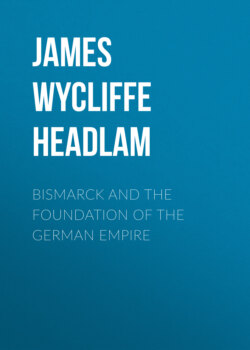Bismarck and the Foundation of the German Empire

Реклама. ООО «ЛитРес», ИНН: 7719571260.
Оглавление
James Wycliffe Headlam. Bismarck and the Foundation of the German Empire
Bismarck and the Foundation of the German Empire
Table of Contents
PREFACE
ILLUSTRATIONS
BISMARCK
CHAPTER I
CHAPTER II
CHAPTER III
CHAPTER IV
CHAPTER V
CHAPTER VI
CHAPTER VIII
CHAPTER IX
CHAPTER XI
CHAPTER XII
CHAPTER XIII
CHAPTER XIV
CHAPTER XV
FOOTNOTES:
INDEX
Отрывок из книги
James Wycliffe Headlam
Published by Good Press, 2019
.....
EARLY LIFE.
Of the boy's early life we know little. His mother was ambitious for her sons; Otto from his early years she designed for the Diplomatic Service; she seems to have been one of those women who was willing to sacrifice the present happiness of her children for their future advancement. When only six years old the boy was sent away from home to a school in Berlin. He was not happy there; he pined for the free life of the country, the fields and woods and animals; when he saw a plough he would burst into tears, for it reminded him of his home. The discipline of the school was hard, not with the healthy and natural hardships of life in the open air, but with an artificial Spartanism, for it was the time when the Germans, who had suddenly awoke to feelings of patriotism and a love of war to which they had long been strangers, under the influence of a few writers, were throwing all their energies into the cultivation of physical endurance. It was probably at this time that there was laid the foundation of that dislike for the city of Berlin which Bismarck never quite overcame; and from his earliest years he was prejudiced against the exaggerated and affected Teutonism which was the fashion after the great war. A few years later his parents came to live altogether in the town; then the boy passed on to the Gymnasium, boarding in the house of one of the masters. The teaching in this school was supplemented by private tutors, and he learned at this time the facility in the use of the English and French languages which in after years was to be of great service to him. The education at school was of course chiefly in the classical languages; he acquired a sufficient mastery of Latin. There is no evidence that in later life he continued the study of classical literature. In his seventeenth year he passed the Abiturienten examination, which admitted him as a student to the university and entitled him to the privilege of serving in the army for one instead of three years. His leaving certificate tells us that his conduct and demeanour towards his comrades and teachers were admirable, his abilities considerable, and his diligence fair.
.....